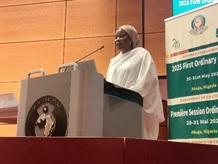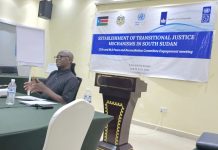By Kebba AF Touray
Violent conflict was responsible for 98 percent of terrorism-related deaths in 2023, a stark figure highlighted by Hon. Dr. Zainab Gimba, a Nigerian member of the ECOWAS Parliament, during a session on Tuesday. Speaking before the regional legislature, Dr. Gimba called for urgent and strengthened security cooperation to address the escalating threat of terrorism and violent extremism across West Africa and the Sahel.
Delivering a motion titled “Strengthening Regional Security Cooperation in Response to the Escalating Threat of Terrorism and Violent Extremism in West Africa and the Sahel,” Dr. Gimba cited the Global Terrorism Index 2024 to underscore the deadly toll of violence. “Violent conflict remains the primary driver of terrorism, with over 90 percent of attacks and 98 percent of terrorism deaths occurring in conflict-affected countries,” she said.
She pointed to testimony from a captured bandit in Zamfara, Nigeria, who acknowledged that regional instability — particularly in Burkina Faso, Niger, and Mali — facilitates their operations and supplies weaponry, further fueling insecurity.
The statistics reveal a grim reality: Sub-Saharan Africa accounts for nearly 59 percent of all terrorism fatalities worldwide. The Sahel region alone represented 19 percent of global terrorist attacks and more than half of terrorism-related deaths in 2024, rising from 48 percent the previous year.
Dr. Gimba painted a detailed picture of the region’s violence. Between July and October 2024, Burkina Faso recorded more than 1,500 deaths tied to violent incidents, including several large-scale attacks by the Jama‘at Nusrat al-Islam wal-Muslimin (JNIM), which killed hundreds of military personnel. Niger similarly suffered hundreds of fatalities, including a deadly Islamic State attack on a mosque that left dozens dead in March 2025. Mali continued to grapple with attacks by extremist groups claiming responsibility for over a thousand deaths during the same period.
Togo has also experienced a rise in violent attacks, with multiple assaults killing soldiers and civilians alike. Meanwhile, in Nigeria’s Borno State, clashes between Boko Haram and Islamic State West Africa fighters have caused significant casualties on both sides, along with many civilian deaths.
Dr. Gimba detailed recent militant incursions into Nigeria’s northwest, where vigilantes were killed defending their communities, and an attack on farming villages near Baga that resulted in dozens of civilian deaths. These attacks have displaced thousands, exacerbating the region’s humanitarian crisis.
In response, Dr. Gimba urged ECOWAS lawmakers to pass resolutions aimed at reinforcing regional security. She called for dialogue to reintegrate Mali, Burkina Faso, and Niger into ECOWAS’s security framework, increased funding for the Multinational Joint Task Force operating in the Lake Chad Basin, and enhanced early-warning systems to track arms trafficking and insurgent movements. She also emphasized boosting support for food security programs to aid populations displaced by violence and climate change.
“These atrocities demand a unified and decisive regional response,” Dr. Gimba told the parliament. “ECOWAS must act now to protect its people and restore peace.”




















